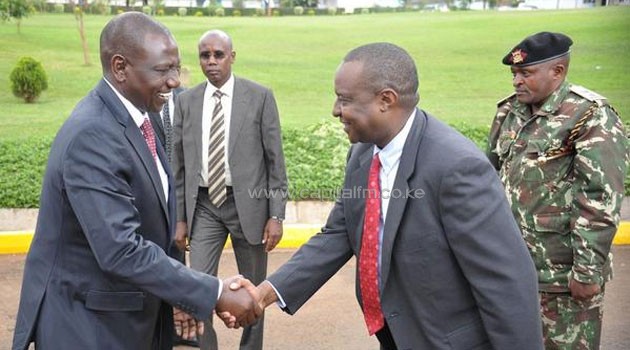
Ruto said out of the 160,000 kilometres of roads that the government intended to tarmac across the country, the county governments would tarmac 120,000 kilometres while the national government will manage the remaining 40,000 kilometres/DPPS
During the third session of the Intergovernmental and Economic Council (IBEC) meeting chaired by Deputy President William Ruto, a resolution was reached that the government would devolve 80 percent of resources meant for roads to the county governments to ensure service delivery to Kenyans.
Ruto said out of the 160,000 kilometres of roads that the government intended to tarmac across the country, the county governments would tarmac 120,000 kilometres while the national government will manage the remaining 40,000 kilometres.
“Even as we wait for legislation, we have asked the Ministry of Transport to identify the 40,000 km of road by name and all the 160,000km of road by name, and the Transition Authority should be able to gazette these roads by name for the national and county governments,” Ruto said.
There had been a push and pull between the national and county governments since the Ministry of Transport and Infrastructure had wanted control of most of the roads in the upper classes(ABC) leaving the counties with the lower ones(DEF and others).
Governors present led by Council of Governors Vice Chairman Salim Mvurya noted that the matter on classification of roads needed to be resolved further intimating that they were currently in a mediation process to determine the pending issues.
Part of the agenda of the meeting was to come up with a borrowing framework to allow counties enhance their infrastructure.
Ruto said that even as this was being formulated, the loans and grants committee set up under IBEC would facilitate sustainable borrowing.
“We have agreed that there will be a prudent mechanism that we will use that has also international best practice so that we do not find ourselves in a situation that we will not like, so that borrowing becomes prudent and responsible and used for the enhancement of infrastructure around the country, ” the Deputy President reiterated.
He added that there was need to have appropriate legislation to set up ceilings for the County Assembly and the County Executives so that there is an agreed way of financial management.
Ruto said it was impressing that those sectors which have been devolved to the counties have been felt by the public citing health and agriculture.
“It is encouraging that public officers including field extension officers, nurses and doctors are now found in their places of work discharging their duties effectively after we devolved the departments of agriculture and health. This is what we want, service delivery and nothing else,” said the Deputy President.
On mechanical transport equipment which were inherited by counties from the defunct county and Municipal Councils, the Deputy President said 80 percent will be controlled by the county governments while the remaining 20 percent of the equipment will remain under the management of the national governments.
“We have brought on board the Transitional Authority in the sharing of the equipment. Some counties are also investing in their own equipment,” said Ruto.
While reiterating the government’s commitment to the success of devolution Ruto said a proposal had been formulated to rename village polytechnics to an internationally recognised term of vocational institutions to be managed by county governments.
“We have had gaps in the development of technical education in the past but with an authority in place to manage them we will achieve our technological targets. Development of technology will actualise Vision 2030,” said the Deputy President.
He added that the future development of the country would be determined by the number of skilled workers and intellectual thinkers and thus the government intended to establish technical training institutes in every constituency.
He also said a separate examination council would be formed to ensure that those students in vocational training institutes sit for a practical exam as opposed to a written one.
Senate Deputy Speaker Kembi Gitura lamented over the non-representation of the Senate in the council yet they were the custodians of county governments.
“IBEC should work build cordial relations with Senate in increasing efficiency in the management of resources,” said Gitura.
Present were Cabinet Secretary Henry Rotich (National Treasury), Controller of Budget Agnes Odhiambo, Commission for Revenue Allocation Chairman Micah Cheserem, Transition Authority Chairman Kinuthia wa Mwangi and Commission for the Implementation of the Constitution chairman Charles Nyachae among other governors and county executive members.









































